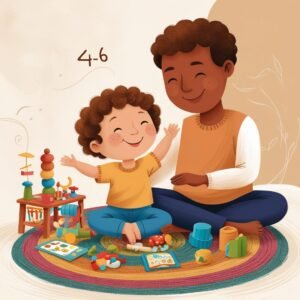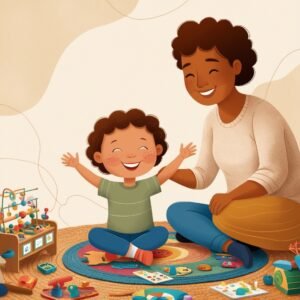Child Development and Parenting
Parenting is a wild mix of love, late nights, and learning on the fly. Some days you’re soaking up snuggles, and others, you’re Googling “why is my toddler throwing cereal at the cat?”
The truth is, no parent has it all figured out—but understanding child development can help you feel more confident and a little less overwhelmed. It’s not about being a perfect parent. It’s about knowing what your child needs at each stage and doing your best to meet them where they are.
This post walks through the key stages of child development and offers practical parenting tips that actually work in real life—not just in parenting books.
Why Child Development Matters (Yes, Even When You’re Just Trying to Get Through the Day)
When you understand how kids grow—emotionally, physically, socially—it gets easier to handle their behavior, set realistic expectations, and know when to worry (or not). You’ll feel more grounded, and they’ll feel more supported.
Child development helps you:
- Understand what’s normal at each age
- Respond to behavior without yelling (most of the time)
- Build stronger bonds with your kids
- Catch potential issues early
A Quick Guide to Child Development Stages (And How to Parent Through Them)
Let’s break down the major stages of development, what’s going on in your kid’s brain and body, and how you can support them through it all.
- Infants (0–12 Months)
What’s going on: Babies are learning everything. They’re building brain connections, forming attachments, and figuring out who’s safe.
What helps:
- Cuddles, eye contact, and soothing build trust.
- Talk, sing, and narrate your day—language learning starts early.
- Tummy time supports motor skills (yes, even if they fuss at first).
💡 Parenting Tip: You can’t spoil a baby. Holding them when they cry teaches them the world is safe.
- Toddlers (1–3 Years)
What’s going on: Walking, talking, tantrums. Toddlers are all about exploring and testing boundaries.
What helps:
- Routines give them a sense of control.
- Offer small choices to encourage independence (“juice or milk?”).
- Stay calm and firm when setting limits.
- Name their feelings (“You’re mad because it’s time to leave—yeah, that’s hard”).
💡 Parenting Tip: They’re not being “bad”—they’re just figuring out how the world works.
- Preschoolers (3–5 Years)
What’s going on: This is the golden age of imagination. Kids are learning empathy, communication, and how to play with others.
What helps:
- Encourage pretend play—it builds problem-solving and emotional skills.
- Read books together and talk about the characters’ feelings.
- Use gentle discipline—timeouts and yelling usually backfire.
- Keep routines predictable, but build in room for creativity.
💡 Parenting Tip: Focus on effort, not perfection. Say “You worked hard on that!” more than “You’re so smart!”
- School-Age Kids (6–12 Years)
What’s going on: They’re becoming more logical, aware of others’ opinions, and influenced by peers. They want independence and reassurance.
What helps:
- Stay involved in their interests and school life.
- Talk openly about emotions, friendships, and challenges.
- Set screen time limits and encourage outdoor play.
- Model the behavior you want to see—kids this age are watching closely.
💡 Parenting Tip: Let them fail sometimes. It builds resilience and problem-solving skills.
- Teens (13–18 Years)
What’s going on: Everything. Identity, mood swings, peer pressure, hormones, and the urge to be independent while still needing support.
What helps:
- Give them space—but stay emotionally available.
- Talk about values, goals, and consequences.
- Set clear boundaries and stick to them.
- Be open about tough topics—yes, even sex, mental health, and social media.
💡 Parenting Tip: They will test you. Don’t take it personally—stay calm and consistent.
The Real Pillars of Effective Parenting
Forget chasing Pinterest-perfect parenting. Here’s what actually makes a difference:
- Connection Is Everything
Your relationship with your child is the foundation. Kids need to feel safe, seen, and loved—even when they mess up.
Ways to build connection:
- Put your phone down and make eye contact
- Listen without interrupting
- Spend time together without an agenda
- Consistency (With a Side of Flexibility)
Clear routines and expectations help kids feel secure. But flexibility shows them how to adapt.
Try this:
- Stick to consistent bedtimes, screen time limits, and rules
- Let them have input when possible—it builds trust
- Be the calm in the chaos, even when they’re losing it
- Positive Discipline
Discipline means “to teach,” not “to punish.” The goal is to help kids learn, not feel bad.
Skip the yelling and try:
- Natural consequences (“If you forget your lunch, you’ll be hungry”)
- Time-ins instead of timeouts
- Reward charts for younger kids (when used sparingly)
- Teaching Emotional Skills
Your child isn’t born knowing how to handle big feelings. That’s your job to teach.
How to help:
- Name emotions out loud (“Looks like you’re really frustrated right now”)
- Model how you handle your own stress
- Let them know all feelings are okay, but not all behaviors are
What About the Really Hard Days?
Some days you’re going to lose your cool. That doesn’t mean you’re a bad parent. It means you’re human.
Here’s what helps:
- Take a breath before reacting
- Apologize when you mess up (this teaches accountability)
- Make time for your own needs—you can’t pour from an empty cup
If parenting ever feels too hard—like you’re burned out or emotionally tapped—please reach out for help. Talk to a friend, therapist, or pediatrician. You’re not alone.
When to Watch for Developmental Concerns
Every kid develops on their own timeline. But trust your gut if you notice:
- No eye contact or social engagement by 12 months
- Not speaking by age 2
- Intense, frequent tantrums beyond toddlerhood
- Trouble connecting with other kids in school
Early support can make a huge difference, so don’t wait to ask for help.
Final Word: There’s No “Right Way”—Just What’s Right for Your Family
There’s no magic formula for raising great kids. But if you:
- Show up
- Stay curious
- Stay connected
- Keep learning
…you’re already doing a great job.
Parenting isn’t about perfection. It’s about progress. And you’re not doing it alone



